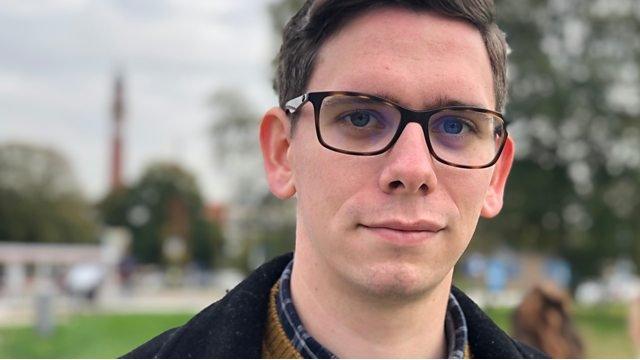Huge rise in students in Scotland seeking mental health support
- Published
More students seek help for mental health issues
The number of university students in Scotland seeking support for mental health issues has increased by two-thirds over five years, analysis shows.
The BBC asked universities across Scotland for the numbers of students seeking some form of support.
It found more than 11,700 students asked for help in 2016-17 compared with about 7,000 in 2012-13.
The 68% increased among students in Scotland was higher than the 53% total for the UK over the same period.
University counsellors and wellbeing staff told BBC Scotland that they deal with cases ranging from anxiety, depression, gender-based violence and body dysmorphia.
The figures - obtained by the BBC's Shared Data Unit through freedom of information requests - showed that only 12 of Scotland's 19 universities recorded how many students sought help for their health help over the five-year period.

The data shows:
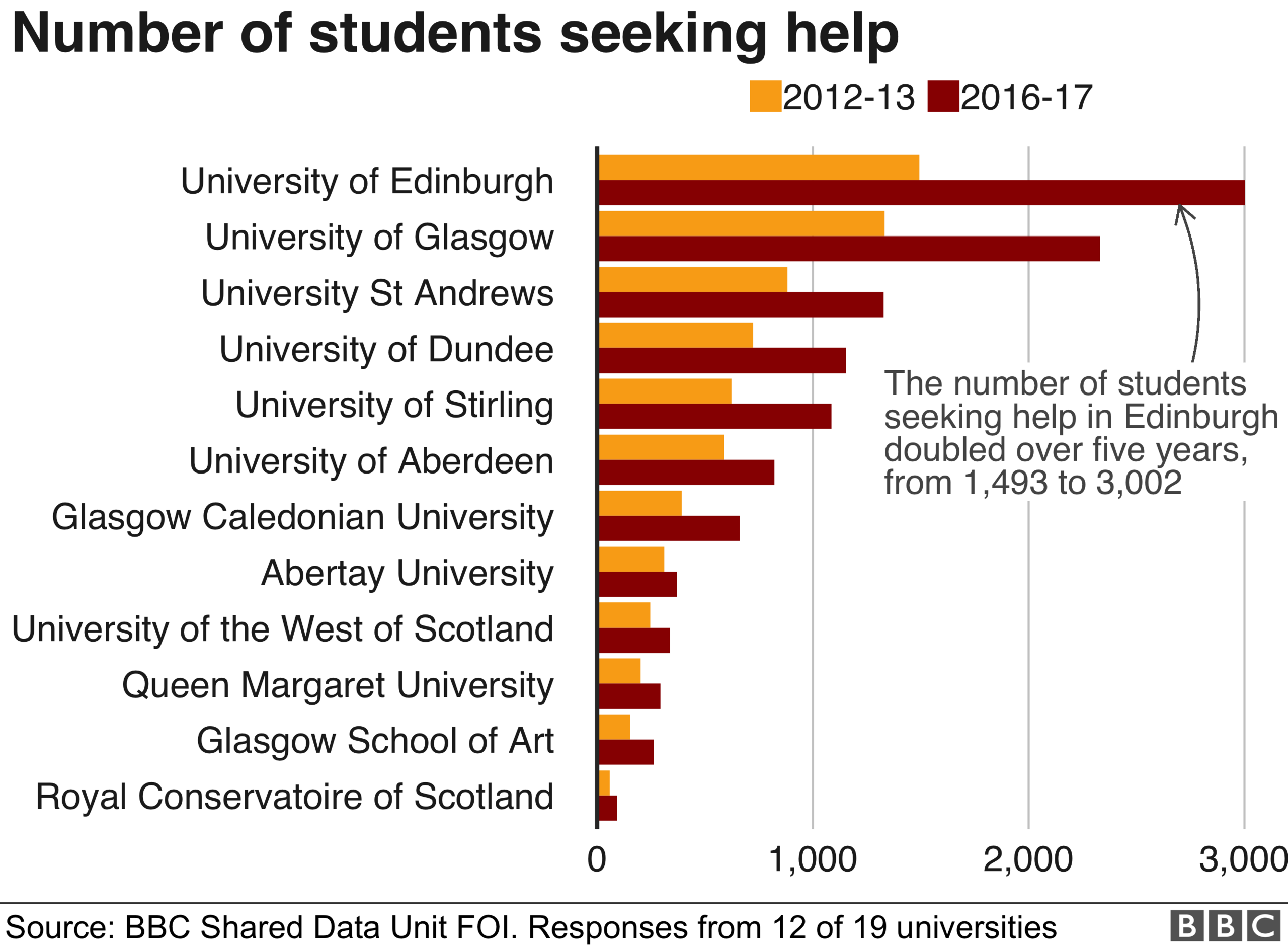
The number of students seeking help for their mental health at the University of Edinburgh doubled over five years
The University of Glasgow experienced a 75% rise in students seeking help for their mental health between 2012-13 and 2016-17
The University of Stirling had a 74% rise in students seeking help for their mental health between 2012-13 and 2016-17
Glasgow School of Art experienced a 72% increase in students seeking help for their mental health over the same period

'Not being able to return the favour had a toll on me'
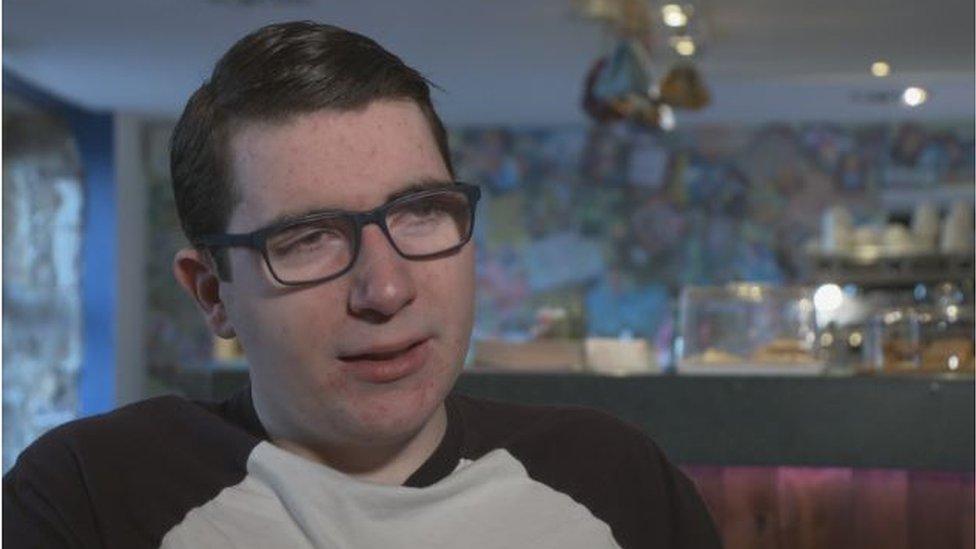
Connor Smith was in his third year studying computer games development at the University of the West of Scotland when his close friend, who was also a student, took his own life.
"I was really shook up and didn't know what to do with myself," he said.
"I had struggled with my mental health before but the person who took his life was able to help me out of that, so not being able to return the favour had a toll on me."
The university's counselling team quickly offered to help Connor.
"I couldn't speak to my family because I felt like I was burdening them," he said.
"I couldn't speak to my close friends either because they were going through the same thing."
Connor said that he was struggling not only with the death of his friend but also his future prospects.
He said: "One evening I sat down and thought 'what am I doing?'.
"I forced myself to work at university but I wasn't in a good mind space. I really wasn't enjoying what I was doing."
Connor said he did not know what would have come of his life had it not been for the university's support.
He said: "I wouldn't have done so well.
"I might've quit university and if I did that, I don't know what I would be doing.
"I had nothing lined up as a fall-back."
Connor returned to counselling for a second time during his final year of studying. He was struggling with stress, overeating and had money worries.
He said: "[The support] wasn't immediately available like before but, when I did get it, being able to speak to someone was so helpful.
"University was the best stretch of my life but easily the lowest I have been as well."

'I don't like the term snowflake'
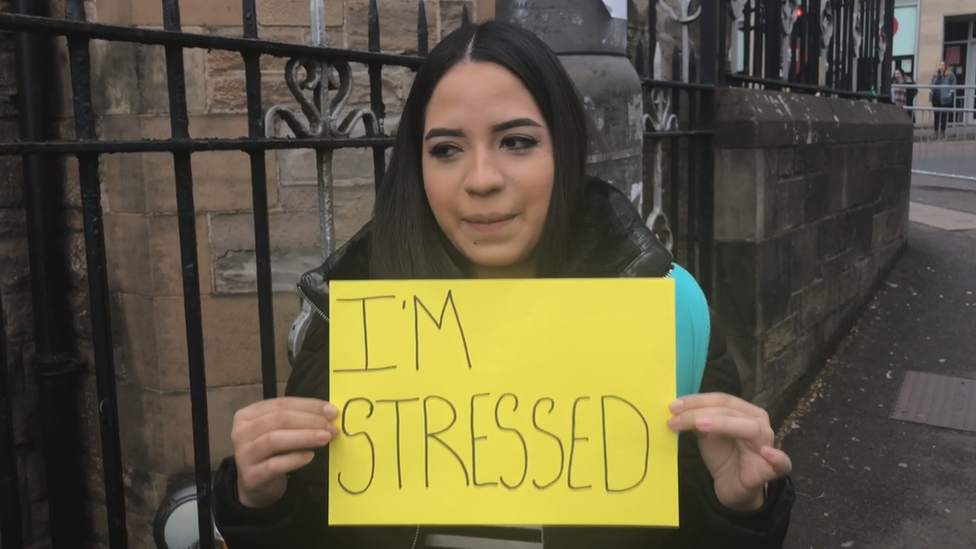
Ronnie Millar, director of counselling at the University of Edinburgh, said there is a "pernicious perfectionism" among students, which can affect their mental health.
He said: "When I was at university, there were no fees and we had student grants.
"Nowadays, more students have to work in part-time jobs and study, which puts a lot of pressure on them to succeed."
Mr Millar said it was not helpful to label young people seeking help with terms such as snowflake, which imply they are less resilient than previous generations and too emotionally vulnerable.
He said: "I don't like the term snowflake. I think it is a pejorative.
"In terms of resilience, some students struggle more than previous generations - but that's not pointing the finger of blame."
Mr Millar said that while there's been a doubling in the male students coming forward for help for their mental health, the "proportion" has stayed the same over the five-year period.
"We say to students that [counselling] is not activity just for women, it's for everyone."
Social media bubble
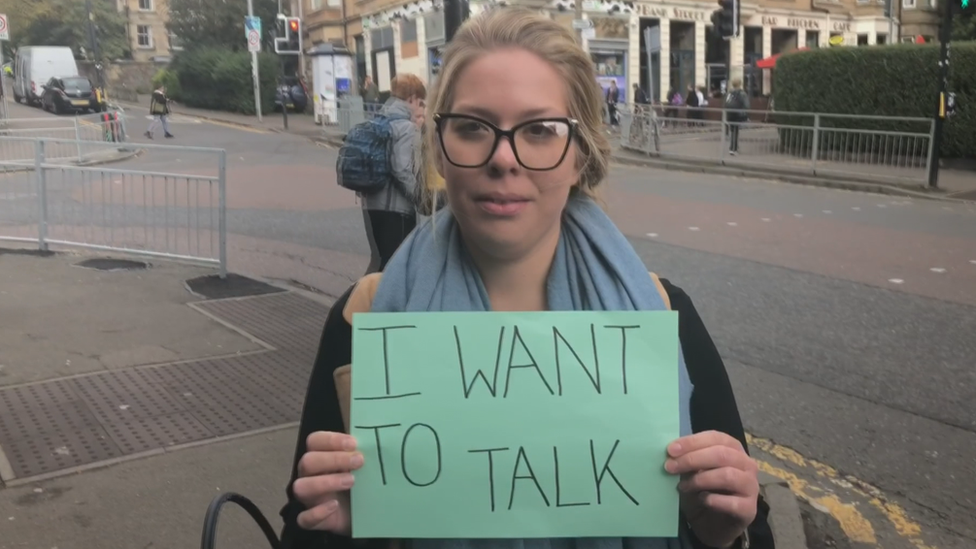
Dr Phil Quinn, head of counselling and psychological services at the University of Glasgow, said that while there was greater awareness of the help available, a "saturated" NHS had resulted in fewer community services for students to access mental health support.
He said: "We have had a record year in terms of referrals to the service, of students starting their university careers with already diagnosed mental health conditions."
The University of Glasgow employed 20 staff in 2016-17 - ranging from cognitive behavioural therapists and a consultant psychiatrist to a counselling manager - to assist with the 2,330 students that came forward that year.
Quinn believes that staff numbers are sufficient to meet demand, and that the increase in students coming forward for help is partly down to a "24-hour social media bubble" where they are exposed to "criticism, bullying, and abuse".
'Crisis students'
Jackie Main, who is the director of student life at Glasgow Caledonian University, said it was not just the volume of students seeking support that was increasing but the complexity of the issues they presented with.
"We see a lot more crisis students than before," she said.
"That could mean a student is actively self-harming, threatening suicide or requires being sectioned or hospitalised.
"Crisis students experience severe emotional distress, including panic attacks."
At Glasgow Caledonian University, the number of students seeking support in 2016-17 hit 661, up 69% since 2012-13.
Ms Main added: "Anxiety and depression are the two big issues we've see increases in.
"We are not a crisis support service. We don't have the resource and it is not our job. But we don't let students fall through the net."
Budgets
Eight of Scotland's universities provided the BBC with their total budgets for mental health services - which in some cases included services that don't just support student mental health, such as a disability service - in the five years to 2016-7.
It revealed an increase of 31% from £2.4m to £3.1m.
The University of Strathclyde (which did not provide complete figures for the number of students seeking help between 2012-13 and 2016-17) was the only institution to report a decrease in its overall budget over the five year period, down by 18%.
A spokeswoman for the university put the drop down to "re-structuring" and emphasised that significant investment - about £400,000 - had been made since 2017, including the creation of three full-time and 12 part-time posts on the mental health and wellbeing teams.
She said: "We have also introduced an online mental health support programme, which works hand-in-hand with our dedicated advisers and therapists, to ensure support is available for all."

'Finding out you've failed all your classes is horrible'
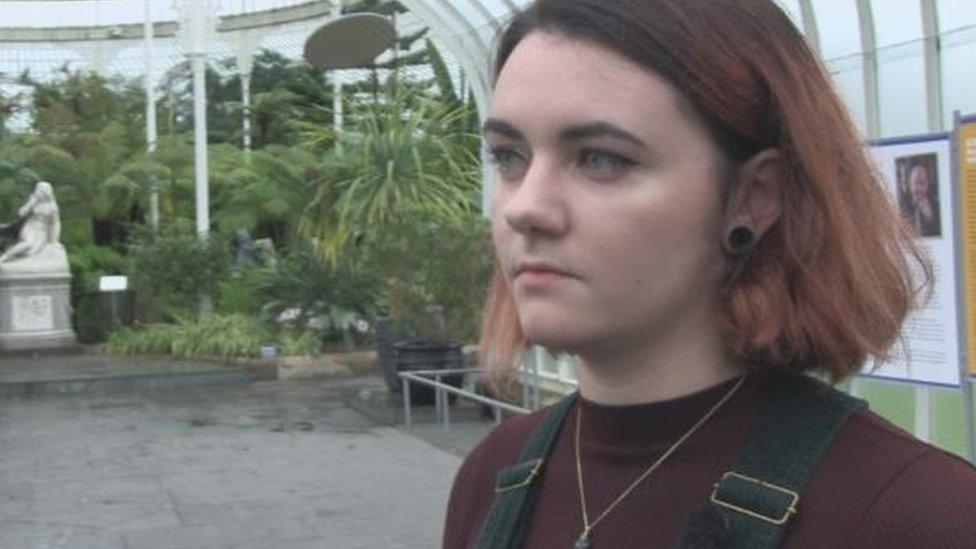
Hannah Moles was in her third year of studying maths at the University of Strathclyde when she approached student services for help.
Not only had she failed her first set of exams but she was also caring for her grandmother who had dementia.
She said: "My brother and I were going over three times a week to make my gran dinner, get the shopping and keep her company.
"She was really lonely."
Hannah said that when she wasn't caring for her gran, working in a part-time job which paid for her flat, or sleeping, she'd be in the library trying to study.
"I was really tired and had things on my mind constantly," she said.
"So I went along to support services to see if I could calm myself down. I wanted to improve my mental state before my next set of exams."
Hannah said that eight weeks after approaching student services, she received her first counselling appointment.
However, by this point Hannah had failed her second round of exams - meaning she wouldn't be allowed to return for the fourth year of her degree.
"Finding out you've failed all your classes is horrible especially when you have put in the work but it is still not enough," she said.
Hannah said that she was grateful to her university for providing mental health support but more counsellors would help meet the increasing demand.
"I am lucky that I got the support I needed," she said.
"But there are lots of students who seem to need help with their mental health. I just hope that universities can keep up with the increasing demand."

'80 new counsellors'
The Scottish government's most recent Programme for Government promised to provide more than 80 additional counsellors in further and higher education institutions over the next four years, with an investment of about £20m.
However, there is no indication yet how the funding will be split or which universities will receive more counsellors.
Health Secretary Jeane Freeman said every student "should have access to emotional and mental well-being support".
"We will work closely with the university and college sectors, NUS Scotland and other partners, on the implementation of the additional counsellors, and to ensure an integrated and wrap-around approach to student wellbeing in higher and further education."
Details of organisations offering information and support with mental health issues are available at bbc.co.uk/actionline, or you can call for free, at any time to hear recorded information on 0800 888 809.
- Published29 October 2018
